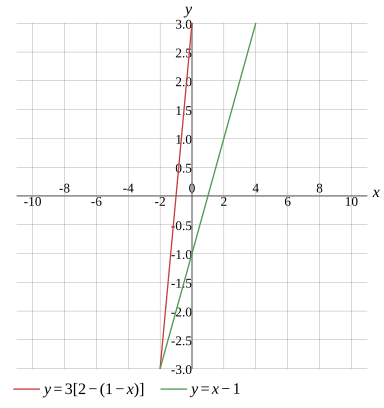Question
Solve the equation
x=−2
Evaluate
3(2−(1−x))=x−1
Subtract the terms
More Steps


Evaluate
2−(1−x)
If a negative sign or a subtraction symbol appears outside parentheses, remove the parentheses and change the sign of every term within the parentheses
2−1+x
Subtract the numbers
1+x
3(1+x)=x−1
Expand the expression
More Steps


Evaluate
3(1+x)
Apply the distributive property
3×1+3x
Any expression multiplied by 1 remains the same
3+3x
3+3x=x−1
Move the expression to the left side
3+3x−x=−1
Move the expression to the right side
3x−x=−1−3
Add and subtract
More Steps


Evaluate
3x−x
Collect like terms by calculating the sum or difference of their coefficients
(3−1)x
Subtract the numbers
2x
2x=−1−3
Add and subtract
2x=−4
Divide both sides
22x=2−4
Divide the numbers
x=2−4
Solution
More Steps


Evaluate
2−4
Reduce the numbers
1−2
Calculate
−2
x=−2
Show Solution

Rewrite the equation
x=−2
Evaluate
3(2−(1−x))=x−1
Evaluate
More Steps


Evaluate
3(2−(1−x))
Subtract the terms
More Steps


Evaluate
2−(1−x)
If a negative sign or a subtraction symbol appears outside parentheses, remove the parentheses and change the sign of every term within the parentheses
2−1+x
Subtract the numbers
1+x
3(1+x)
3(1+x)=x−1
Multiply
More Steps


Evaluate
3(1+x)
Apply the distributive property
3×1+3x
Any expression multiplied by 1 remains the same
3+3x
3+3x=x−1
Move the variable to the left side
3+2x=−1
Move the constant to the right side
2x=−4
Solution
x=−2
Show Solution

Graph
